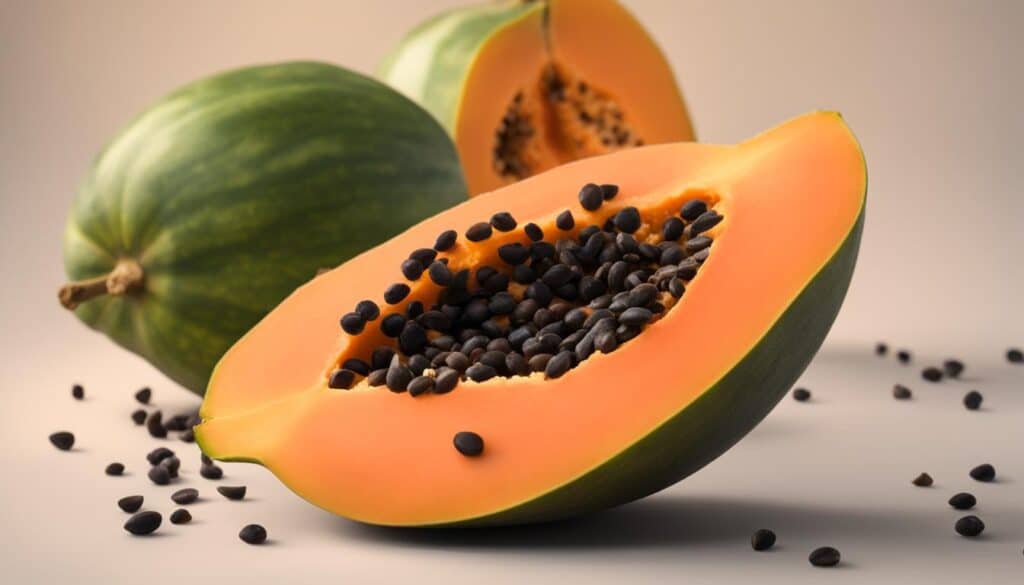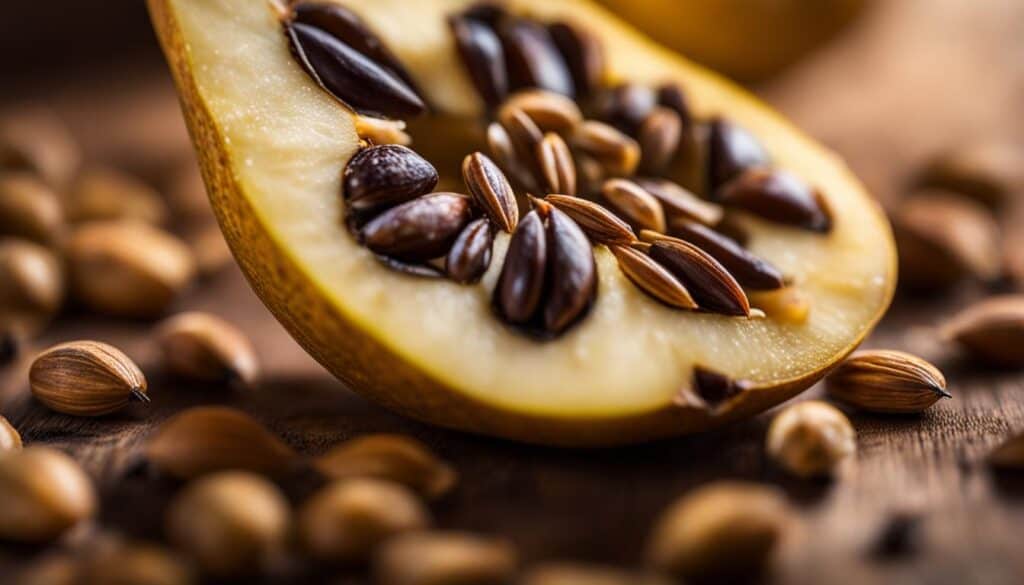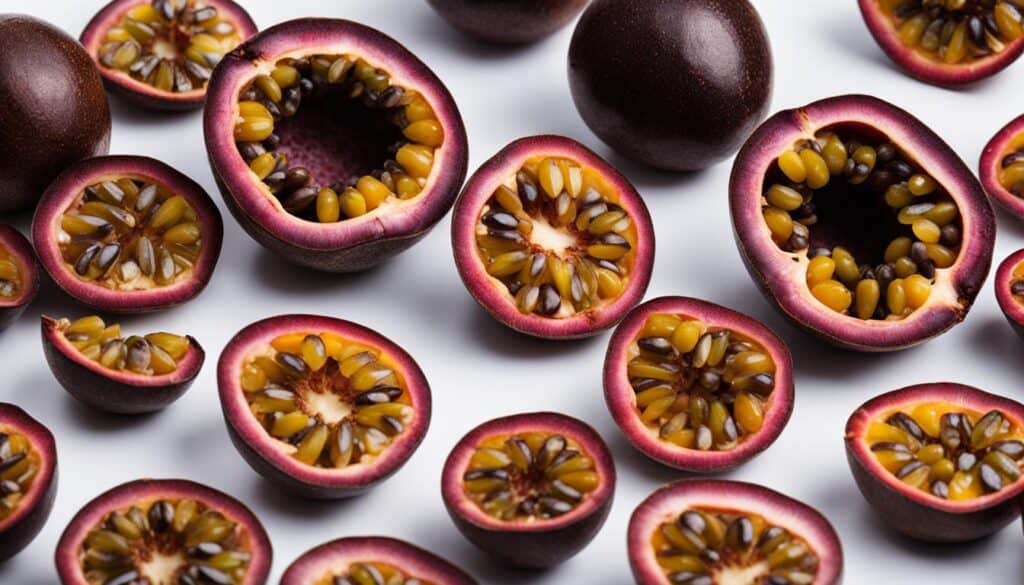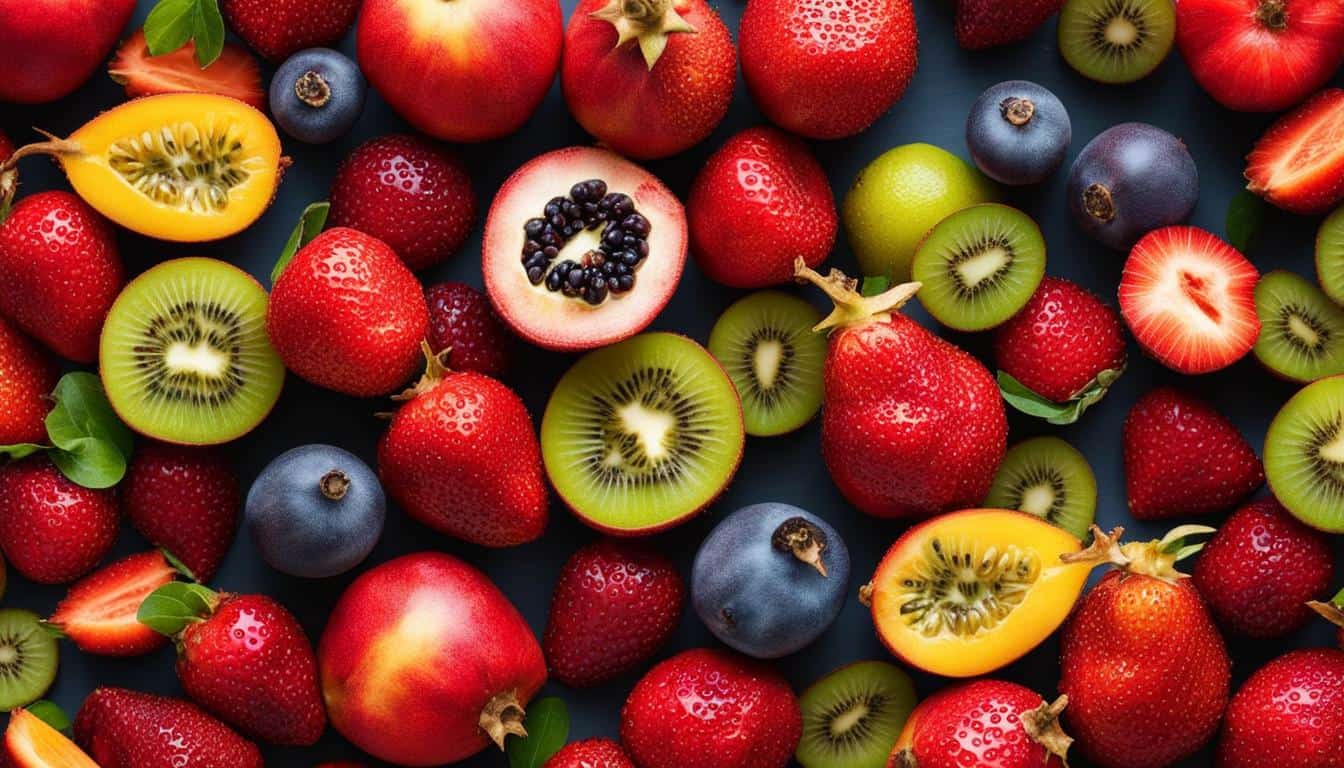Fruits with seeds are not only delicious but also packed with essential nutrients. They offer a wide range of health benefits and can be a valuable addition to your diet. In this article, we will explore the nutritional power of fruit with seeds and the specific health benefits they provide.
Key Takeaways:
- Fruit with seeds is a nutritional powerhouse, providing essential nutrients for overall health.
- Seed-bearing fruits offer a variety of health benefits, such as improving skin health, aiding digestion, and promoting weight loss.
- Including seeds in your diet can support cardiovascular health, boost energy levels, and contribute to better dental and mental health.
- Seed blends, like those containing pumpkin seeds, sunflower seeds, and flax seeds, offer a convenient way to incorporate these nutritious powerhouses into your meals and snacks.
- There are numerous seed-based products available that make it easy to enjoy the benefits of fruit with seeds.
Watermelon Seeds for Better Skin
Watermelon seeds are not just a nuisance to spit out; they actually offer numerous benefits for your skin. Packed with vitamin C and antioxidants, these tiny seeds can help improve the health and appearance of your skin.
Vitamin C is known for its role in collagen production, which helps keep the skin firm and elastic. It also helps protect the skin from damage caused by free radicals, reducing the signs of aging such as wrinkles and fine lines. Antioxidants, on the other hand, help combat oxidative stress and inflammation, promoting a healthy complexion.
One way to enjoy the benefits of watermelon seeds is by roasting them. Roasted watermelon seeds make a delicious and nutritious snack that you can enjoy on its own or add to salads and trail mixes. Alternatively, you can also eat the seeds directly from the fruit itself.
Watermelon Seed Face Mask Recipe:
- Grind a handful of watermelon seeds into a fine powder.
- Mix the powder with a teaspoon of yogurt.
- Apply the mixture to your face, avoiding the eye area.
- Leave it on for 15-20 minutes, then rinse off with warm water.
By incorporating watermelon seeds into your skincare routine and diet, you can harness their potential for better skin health and a radiant complexion.
Papaya Seeds for a Healthy Digestive System
Papaya seeds contain a powerful enzyme called papain, which is known for its digestive properties. This enzyme helps break down proteins in the digestive system, making it easier for the body to absorb nutrients and prevent digestive issues.
Consuming papaya seeds can aid in regulating digestion, relieving constipation, and reducing bloating. The high fiber content in papaya seeds acts as a natural laxative, promoting regular bowel movements and supporting a healthy digestive system.
Papain Enzyme in Papaya Seeds
“The papain enzyme found in papaya seeds has been used for centuries as a natural remedy for digestive ailments. It helps in breaking down proteins and improving digestion, making it an excellent addition to a healthy diet.”
In addition to their digestive benefits, papaya seeds also possess antimicrobial properties that can help kill harmful bacteria in the gut. This can contribute to a healthier balance of gut flora and reduce the risk of gastrointestinal infections.
| Benefits of Papaya Seeds for Digestive Health |
|---|
| Aids digestion by breaking down proteins |
| Relieves constipation and promotes regular bowel movements |
| Reduces bloating and indigestion |
| Possesses antimicrobial properties to kill harmful bacteria |
To incorporate papaya seeds into your diet, you can simply scoop them out from a ripe papaya and consume them directly, or add them to smoothies, salads, or dressings for an extra nutritional boost. It is recommended to start with a small amount of seeds and gradually increase the intake to prevent any digestive discomfort.
Remember to always choose organic papaya to ensure the highest quality and avoid consuming excessive amounts of papaya seeds as they can have a strong flavor and taste bitter.

Pomegranate Seeds for Weight Loss
Pomegranate seeds are not only delicious but also offer numerous health benefits, including their potential to aid in weight loss. These small, vibrant seeds are packed with essential nutrients and antioxidants that can support your weight management goals. Let’s explore the benefits of pomegranate seeds and how they can contribute to a healthier lifestyle.
The Benefits of Pomegranate Seeds
Pomegranate seeds are rich in antioxidants, particularly polyphenols, which have been shown to have anti-inflammatory and anti-obesity effects. These antioxidants help combat oxidative stress and reduce inflammation in the body, which can promote weight loss and overall well-being.
In addition to antioxidants, pomegranate seeds are a good source of dietary fiber. Fiber plays a crucial role in weight management as it helps keep you feeling fuller for longer, reducing the likelihood of overeating. Including pomegranate seeds in your diet can help curb your appetite and support healthy portion control.
Ways to Incorporate Pomegranate Seeds Into Your Diet
There are various ways to enjoy the nutritional benefits of pomegranate seeds. Here are a few ideas:
- Add pomegranate seeds to your salads for a burst of flavor and added texture.
- Mix pomegranate seeds into your yogurt or oatmeal for a nutritious and satisfying breakfast.
- Blend pomegranate seeds into a smoothie for a refreshing and antioxidant-rich drink.
- Sprinkle pomegranate seeds on top of your favorite dishes, such as roasted vegetables or grilled chicken, to enhance their taste and nutritional value.
With their sweet-tart flavor and crunchy texture, pomegranate seeds can be a delightful addition to a wide range of recipes, both savory and sweet.
| Nutrient | Amount per 100g |
|---|---|
| Calories | 83 |
| Protein | 1.7g |
| Total Fat | 1.2g |
| Carbohydrates | 18.7g |
| Fiber | 4g |
| Vitamin C | 10.2mg |
| Potassium | 236mg |
Enjoy the delicious taste and weight loss benefits of pomegranate seeds by incorporating them into your daily meals and snacks. With their nutritional profile and versatility, they can be a valuable addition to a balanced diet.
Avocado Seeds for Cardiovascular Health
Avocado seeds, often overlooked, contain beneficial compounds that promote cardiovascular health and support overall heart health. Research suggests that avocado seeds can have a positive impact on heart health and blood vessels due to their rich nutritional profile.
One of the main benefits of avocado seeds is their high content of antioxidants, which help reduce oxidative stress and inflammation in the body. These antioxidants, such as polyphenols and flavonoids, play a crucial role in protecting the cardiovascular system from damage caused by free radicals.
Additionally, avocado seeds are a good source of dietary fiber, which is essential for maintaining healthy cholesterol levels. High cholesterol levels can contribute to the development of heart disease, and consuming avocado seeds can help regulate cholesterol levels and reduce the risk of cardiovascular problems.
The Nutritional Power of Avocado Seeds
Avocado seeds are rich in essential nutrients, including potassium, magnesium, and vitamin E. Potassium helps regulate blood pressure, while magnesium supports healthy heart rhythm and muscle function. Vitamin E is a powerful antioxidant that further protects the cardiovascular system from oxidative damage.
| Nutrient | Amount per 100g |
|---|---|
| Potassium | 1068mg |
| Magnesium | 347mg |
| Vitamin E | 9.7mg |
To incorporate avocado seeds into your diet, they can be blended into a powder and added to smoothies, oatmeal, or salads. Some people also use avocado seed powder to make a nutritious tea. It’s important to note that the seeds should be thoroughly dried and ground before consumption to ensure optimal safety and digestibility.
Avocado seeds are a versatile and often overlooked source of cardiovascular health benefits. By including them in your diet, you can harness their nutritional power and support a healthy heart and overall cardiovascular well-being.

Health Benefits of Orange Seeds:
- Provides an energy boost
- Rich in vitamin C and antioxidants
- High in fiber for better digestion
- Contains essential minerals like calcium and magnesium for bone health
African Pear Seeds for Healthy Teeth
African pear seeds are a hidden gem when it comes to dental health. These seeds are packed with essential nutrients, particularly calcium, which is vital for maintaining strong and healthy teeth. Incorporating African pear seeds into your diet can contribute to the growth and maintenance of your teeth, ensuring that they stay in optimal condition.
Calcium is a key mineral for dental health as it helps to strengthen tooth enamel, the protective outer layer of your teeth. By consuming African pear seeds or using their oil as a supplement, you can provide your teeth with the necessary nutrients to promote optimal oral health.
Furthermore, African pear seeds can also have a positive impact on your overall dental health. They are known to possess antibacterial properties, which can help fight against harmful bacteria that can lead to tooth decay and gum disease. By incorporating African pear seeds into your diet, you can support your dental health and keep your smile shining bright.
| Nutrient | Amount per 100g |
|---|---|
| Calcium | 42mg |
| Potassium | 288mg |
| Magnesium | 19mg |
| Vitamin C | 3mg |
Did you know? African pear seeds are not only beneficial for dental health but also contain other essential nutrients such as potassium, magnesium, and vitamin C. These nutrients contribute to overall oral health and can help prevent oral health issues.
Adding African pear seeds to your diet is simple and easy. You can eat the seeds directly or grind them into a powder and incorporate them into your meals and snacks. They can be added to smoothies, salads, or used as a topping for yogurt or oatmeal. With their nutritional benefits, African pear seeds can be a valuable addition to any dental health regimen.

Passion Fruit Seeds for Mental Health
Passion fruit seeds may be small, but they pack a powerful punch when it comes to promoting mental health. These tiny seeds are rich in an essential mineral called magnesium, which plays a crucial role in managing anxiety levels and promoting overall mental well-being.
Magnesium is known for its calming effects on the nervous system, helping to reduce feelings of anxiety and stress. Incorporating passion fruit seeds into your diet can provide a natural way to support your mental health and enhance your overall mood.
“Passion fruit seeds are nature’s little stress relievers. They contain magnesium, which is known for its ability to calm the mind and promote a sense of relaxation. Snacking on these seeds or adding them to your favorite dishes can be a delicious and nutritious way to support your mental well-being.”
In addition to their magnesium content, passion fruit seeds are also a good source of other nutrients such as fiber, vitamin C, and antioxidants. These nutrients contribute to overall health and well-being, supporting a balanced diet and lifestyle.
| Nutrient | Amount per Serving |
|---|---|
| Magnesium | 15% of daily recommended intake |
| Fiber | 2 grams |
| Vitamin C | 10% of daily recommended intake |
| Antioxidants | High levels |
Whether enjoyed on their own as a snack, added to smoothies, or sprinkled over yogurt, passion fruit seeds offer a convenient and delicious way to support your mental health. So go ahead and embrace the power of passion fruit seeds in your daily diet for a happier and healthier mind.

The Nutritional Power of Seed Blends
Seed blends, such as those found in products like 88 Acres, offer a variety of nutritional benefits. These blends often include a combination of popular seeds like pumpkin seeds, sunflower seeds, and flax seeds. Let’s take a closer look at the nutritional benefits of these seed blends:
Pumpkin Seeds
Pumpkin seeds are a rich source of essential vitamins and minerals. They are packed with iron, magnesium, zinc, and vitamin K. These nutrients play a crucial role in supporting overall health, including bone strength, immune function, and heart health.
Sunflower Seeds
Sunflower seeds are known for their high content of healthy fats, fiber, and antioxidants. They are particularly rich in vitamin E, which acts as a powerful antioxidant and helps protect the body against oxidative stress. Sunflower seeds also provide a good amount of protein, making them an excellent addition to a plant-based diet.
Flax Seeds
Flax seeds are a fantastic source of omega-3 fatty acids, fiber, and lignans. Omega-3 fatty acids are essential for brain health, heart health, and reducing inflammation in the body. The high fiber content in flax seeds supports healthy digestion and may help lower cholesterol levels. Lignans, on the other hand, have been associated with a reduced risk of certain cancers.
| Seed Blend | Nutritional Benefits |
|---|---|
| Pumpkin Seeds | Rich in iron, magnesium, zinc, and vitamin K. Supports bone strength, immune function, and heart health. |
| Sunflower Seeds | High in healthy fats, fiber, antioxidants, and vitamin E. Supports heart health, provides protein, and acts as an antioxidant. |
| Flax Seeds | Excellent source of omega-3 fatty acids, fiber, and lignans. Supports brain health, heart health, digestion, and may lower cholesterol levels. |
Seed blends are a nutrient-dense source of energy and can be easily incorporated into meals and snacks. Whether you sprinkle them on top of salads, add them to smoothies, or enjoy them in seed-based bars and granolas, seed blends offer a convenient way to boost your intake of essential vitamins, minerals, and heart-healthy fats.
How to Incorporate Seeds Into Your Diet
Incorporating seeds into your diet can be a simple and delicious way to boost your nutrition. There are various ways to enjoy the benefits of seeds, whether it’s through seed-based recipes or convenient seed-based products. Here are some ideas to help you get started:
Seed Recipes:
Experiment with seed recipes to add flavor, texture, and nutrition to your meals. Here are some seed-based recipe ideas:
- Seed crackers: Make your own homemade crackers using a blend of seeds, herbs, and spices.
- Chia pudding: Create a nutritious and filling breakfast or snack by soaking chia seeds in your favorite plant-based milk.
- Seed butter: Blend different seeds, such as sunflower, pumpkin, and sesame seeds, to make a homemade seed butter spread.
Seed-Based Products:
If you’re looking for convenience, there are plenty of seed-based products available in stores or online. Here are some popular options:
- Seed bars: Grab a seed bar for a quick and healthy on-the-go snack.
- Seed granola: Sprinkle seed-based granola over yogurt or oatmeal for added crunch and nutrition.
- Seed blends: Explore ready-made seed blends that combine different types of seeds for a convenient way to incorporate a variety of nutrients into your meals.
Remember to read the ingredient labels and choose products that are made with natural ingredients and minimal additives. Seeds can be a versatile and nutritious addition to your diet, so get creative and enjoy the benefits they provide!
Table:
| Seed Type | Nutritional Benefits |
|---|---|
| Chia seeds | High in fiber, omega-3 fatty acids, and antioxidants |
| Sunflower seeds | Rich in vitamin E, magnesium, and healthy fats |
| Pumpkin seeds | Packed with iron, zinc, and plant-based protein |
| Flax seeds | Excellent source of omega-3 fatty acids and lignans |
Table: Nutritional benefits of different types of seeds.
Conclusion
Fruit with seeds is a nutritional powerhouse, offering a wide range of health benefits. Incorporating fruits with edible seeds into your diet can have a positive impact on your overall well-being. From improving skin health with watermelon seeds to supporting cardiovascular health with avocado seeds, these fruits provide a natural way to boost your health.
Not only are fruit seeds packed with essential nutrients like vitamins and minerals, but they also offer unique properties that can address specific health concerns. Whether you’re looking to enhance your digestive system with papaya seeds or boost your energy levels with orange seeds, there’s a fruit with seeds to meet your needs.
With their diverse benefits, fruit with seeds can be enjoyed in various forms. You can snack on roasted watermelon seeds, sprinkle pomegranate seeds on your meals, or blend avocado seeds into smoothies. There are endless possibilities for incorporating these seeds into your daily routine.
So, why not start exploring the variety of seed options available and find creative ways to enjoy their nutritional benefits? Embrace the power of fruit with seeds and take a step towards a healthier and more balanced diet. Your body will thank you for it!
FAQ
Are there any health benefits to eating fruit with seeds?
Yes, fruit with seeds is packed with essential nutrients and offers a wide range of health benefits.
What are the benefits of watermelon seeds?
Watermelon seeds are rich in vitamin C and antioxidants, which can help improve skin health and treat acne.
How can I consume watermelon seeds?
You can enjoy roasted watermelon seeds as a tasty snack or eat them directly from the fruit.
What are the benefits of papaya seeds?
Papaya seeds contain the enzyme papain, which aids digestion and improves the health of the digestive system.
How can I consume papaya seeds?
Papaya seeds can be consumed along with the fruit or used as a seasoning for salads.
What are the benefits of pomegranate seeds?
Pomegranate seeds are rich in essential nutrients and antioxidants, making them a great addition to a weight loss diet as they can boost metabolism and aid in weight management.
How can I consume pomegranate seeds?
You can sprinkle pomegranate seeds on your meals or enjoy them as a healthy juice.
What are the benefits of avocado seeds?
Avocado seeds contain beneficial compounds that promote cardiovascular health and have a positive impact on heart health and blood vessels.
How can I consume avocado seeds?
Avocado seeds can be blended into a powder and used in smoothies or teas to reap their cardiovascular benefits.
Are orange seeds beneficial?
Yes, orange seeds provide an energy boost due to their nutrient content, and they are rich in vitamin C.
How can I consume orange seeds?
Orange seeds can be consumed along with the fruit or added to meals and drinks for an extra burst of energy.
What benefits do African pear seeds offer?
African pear seeds are loaded with nutrients, including calcium, which is essential for healthy teeth and overall dental health.
How can I consume African pear seeds?
You can consume African pear seeds or use their oil as a supplement to contribute to the growth and maintenance of strong teeth.
What benefits do passion fruit seeds provide?
Passion fruit seeds are rich in magnesium, which plays a role in managing anxiety levels and supporting mental health.
How can I consume passion fruit seeds?
Passion fruit seeds can be enjoyed along with the fruit or used to make a juice.
What are the benefits of seed blends?
Seed blends, such as those found in products like 88 Acres, offer a variety of nutritional benefits as they are packed with vitamins, minerals, and heart-healthy fats.
How can I incorporate seed blends into my diet?
You can break a seed bar into small pieces, sprinkle seed-based granola over yogurt or oatmeal, blend seeds into smoothies, or use them as a topping for salads or soups.
How can I incorporate seeds into my diet in general?
You can incorporate seeds into your diet by breaking seed bars into small pieces, sprinkling seed-based granola over yogurt or oatmeal, blending seeds into smoothies, using them as a topping for salads or soups, or grinding them into flour for baking.
Where can I find seed-based products?
There are numerous seed-based products available that provide a convenient way to incorporate seeds into your daily routine.
What is the overall nutritional power of fruit with seeds?
Fruit with seeds is a nutritional powerhouse, offering a wide range of health benefits from improving skin health to supporting cardiovascular health and weight loss.





Leave a Reply